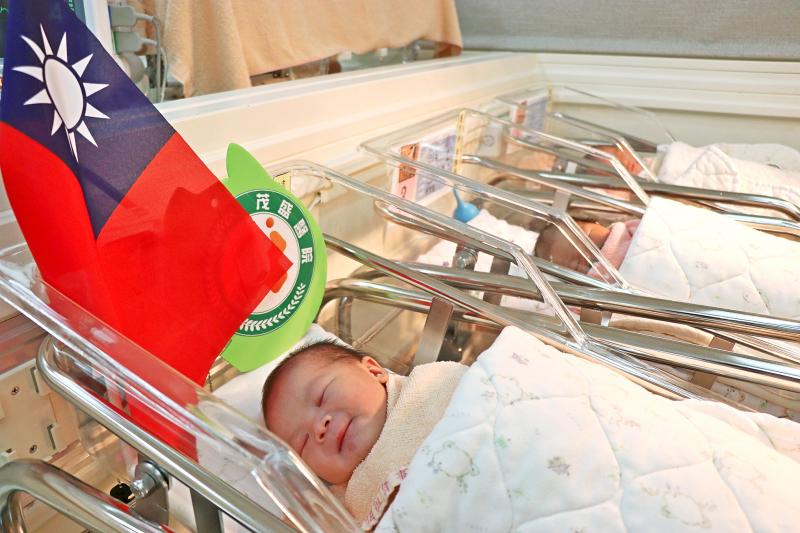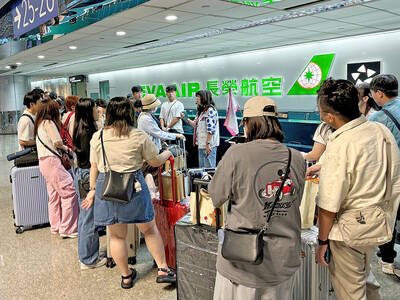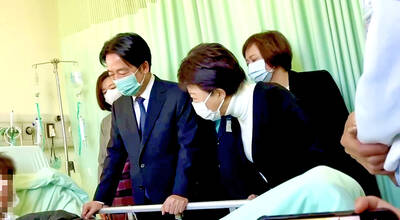Democratic Progressive Party (DPP) lawmakers and the Childcare Policy Alliance on Wednesday urged the government to reform labor regulations to boost the birthrate in Taiwan and keep married women in the workforce.
The law should be amended to allow parental leave in hourly blocks rather than monthly and parents should be entitled to leave until their child is eight, not three as it is now, alliance spokeswoman Huang Chiao-ling (黃喬鈴) told a news conference in Taipei.
These changes would require amendments to the Employment Insurance Act (就業保險法) and the Regulations for Implementing Unpaid Parental Leave for Raising Children (育嬰留職停薪實施辦法), Huang said.

Photo: Tsai Shu-yuan, Taipei Times
The changes would make childcare leave more flexible, which would help boost the nation’s birthrate and the participation of married women in the workforce, alliance convener Liu Yu-hsiu (劉毓秀) said.
Academic studies and data from other countries show that publicly funded childcare properly integrated with parental leave is an effective policy solution, Liu said.
The labor laws stipulate that parents who take childcare leave must do so in monthly blocks, which often permanently removes mothers from the workforce, she said.
The inflexible regulations harm families and business owners, she said.
“Taiwanese parents have the longest work hours in the world, with 50 percent of fathers and 20 percent of mothers working overtime,” National Chung Cheng University associate professor of social welfare Wang Shu-yung (王舒芸) said.
Ministry of Labor data show that 56.6 percent of people aged 25 to 34 work overtime, while a separate study on childrearing showed that parents consider not being with their children under three their biggest challenge, Wang said.
“The global trend is to design regulations that are based on workers’ needs and increase flexibility for parents to spend time with their family,” she said.
It is not enough to give parents unpaid leave, as many have used it all amid the restrictions of the COVID-19 alerts, Confederation of Taipei Trade Unions vice president Wang Yen-chieh (王燕杰) said.
Subsidies for childrearing and creating a family-friendly workplace are important next steps for Taiwanese women, DPP Legislator Lin Shu-fen (林淑芬) said.
“Women should not be forced to choose between their career and children,” Lin said, adding: “Most women are employed in full-time work and will not accept family-friendly policies that reduce their income.”
Taiwan’s childcare leave policy is outdated when compared with other countries that have instituted flexible and paid parental leave, DPP Legislator Fan Yun (范雲) said.
“In Australia, childcare leave laws are written in gender-neutral language and they authorize up to 12 consecutive weeks of paid leave to the parent of any one-year-old,” Fan said. “In addition, parents with children under two are entitled to 30 days of flexible paid leave.”
Using hourly blocks for leave would make it easier for workers and employers to negotiate time off and avoid unwanted and unnecessary disputes, Taiwan Confederation of Trade Unions president Chang Chi-shan (張綺珊) said.
The Chinese-language United Daily News reported that the ministry said allowing workers to take childcare leave for a few hours at a time might not be practicable for all industries.
The ministry is not ready to propose changes at this time, the newspaper reported it as saying.

An alleged US government plan to encourage Taiwan Semiconductor Manufacturing Co (TSMC) to form a joint venture with Intel to boost US chipmaking would place the Taiwanese foundry giant in a more disadvantageous position than proposed tariffs on imported chips, a semiconductor expert said yesterday. If TSMC forms a joint venture with its US rival, it faces the risk of technology outflow, said Liu Pei-chen (劉佩真), a researcher at the Taiwan Industry Economics Database of the Taiwan Institute of Economic Research. A report by international financial services firm Baird said that Asia semiconductor supply chain talks suggest that the US government would

Starlux Airlines on Tuesday announced it is to launch new direct flights from Taiwan Taoyuan International Airport to Ontario, California, on June 2. The carrier said it plans to deploy the new-generation Airbus A350 on the Taipei-Ontario route. The Airbus A350 features a total of 306 seats, including four in first class, 26 in business class, 36 in premium economy and 240 in economy. According to Starlux’s initial schedule, four flights would run between Taoyuan and Ontario per week: Monday, Wednesday, Friday and Saturday. Flights are to depart from Taoyuan at 8:05pm and arrive in California at 5:05pm (local time), while return flights

Nearly 800 Indian tourists are to arrive this week on an incentive tour organized by Indian company Asian Painted Ltd, making it the largest tour group from the South Asian nation to visit since the COVID-19 pandemic. The travelers are scheduled to arrive in six batches from Sunday to Feb. 25 for five-day tours, the Tourism Administration said yesterday. The tour would take the travelers, most of whom are visiting Taiwan for the first time, to several tourist sites in Taipei and Yilan County, including tea houses in Taipei’s Maokong (貓空), Dadaocheng (大稻埕) and Ximending (西門町) areas. They would also visit

HOSPITAL VISITS: Shin Kong Mitsukoshi pledged to give the families of the four people who died NT$11m each and provide support for staff working at the time The central government would assist local governments to enhance public safety, President William Lai (賴清德) said yesterday as he visited people in hospital who were injured in an explosion at a department store in Taichung on Thursday. A suspected gas explosion occurred on the 12th floor of the Shin Kong Mitsukoshi Zhonggang department store in Taichung at 11:33am on Thursday, killing four people and injuring 36. Of the 40 casualties, 39 were hospitalized, Ministry of Health and Welfare data showed. Three died after out-of-hospital cardiac arrests, the data showed. As of 6am yesterday, 25 of those injured had been discharged from hospital, leaving 11